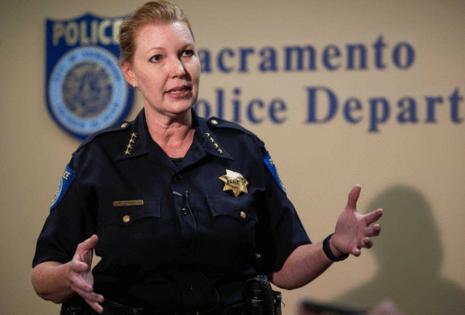Sacramento extends controversial gunshot-detection tech for $2.6 million
Published in News & Features
SACRAMENTO, Calif. — Sacramento will continue using a controversial system of audio sensors to help its police officers respond to gunfire incidents.
On Tuesday night, the City Council approved a multi-year extension of ShotSpotter — technology that detects and locates suspected shooting incidents. The latest contract, which can be terminated without cause at any time, will cost about $2.6 million for five years. Councilmember Mai Vang was the sole vote against the renewal.
The city’s use of the technology has been debated for years.
Supporters, including the Sacramento Police Department, argue the system helps officers reach victims faster, collect ballistic evidence and identify witnesses. But critics say ShotSpotter is costly, prone to false alerts and has no effect on reducing gun violence.
The council on Tuesday also directed the Police Department to provide annual statistics on the effectiveness of the technology. The data is expected to look at false positive rates, arrests, firearm recoveries and the differences in outcomes between ShotSpotter and traditional 911 calls.
“Specifically, I’m interested in the information that’s going to help us make better decisions on a year-to-year basis,” said Councilmember Caity Maple.
Maple had initially opposed the extension and questioned if the technology was worth the cost. Sacramento remains in a structural budget deficit that could reach up to $90 million by 2030, according to staff projections.
Maple pointed to major cities, including Chicago, Baton Rouge, Seattle and Houston, that have ended their contacts with ShotSpotter in recent years. Roughly 180 cities across the country still use this technology, according to California-based SoundThinking, which sells the system.
Cities which have stopped using the system often cite cost and the lack of a meaningful reduction in gunfire violence. A 2023 study from Northeastern University found the technology did not reduce crime, though it helped police decrease their response times to shootings.
“It’s really hard for me to look at the data that we do have and make the judgment that this is a good use of funds,” said Maple, who ultimately voted in favor of the renewal.
Sacramento first contracted with SpotSpotter in 2015, then expanded to three locations by 2018. The system uses audio sensors to detect and locate sounds resembling gunfire and then alerts police within a minute after analysts confirm the noise.
A previous five-year contract was approved in 2020, despite nationwide criticism of police spending. That agreement expired in June, but the sensors have remained active while city leaders reconsidered next steps.
In July, city leaders seemed ready to approve the five-year extension by placing it on the council’s consent calendar — usually reserved for noncontroversial items. But Interim City Manager Leyne Milstein pulled the item, later saying the city wanted to include an “out clause.”
“That’s important to me, just because there is concerns on the community,” said Councilmember Karina Talamantes.
In its presentation on Tuesday, the Police Department praised the tool for cutting response times to gunfire and identifying unreported shootings.
Zachary Bales, deputy chief for the department, said 80% of the ShotSpotter gunfire alerts go unreported by residents. He called the technology a vital part of a broader strategy that has helped reduce citywide firearm assaults from 902 in 2021 to 562 in 2024.
“We believe that ShotSpotter is a crucial piece of that … and we’re seeing a positive result from the use of these dollars,” Bales said.
Vang, in her comments, noted that the Sacramento Community Police Review Commission has recommended that the city cut ties with ShotSpotter since 2023. She also reiterated the data from cities across the nation challenge the effectiveness of the technology in reducing crime. Vang encouraged the city to redirect the money to “proven strategies.”
“You can’t just point to one item as the reason why crime has been down,” Vang said. “I think it’s a holistic approach, and we should be looking at methods that are actually about preventing gun violence when it happens.”
____
©2025 The Sacramento Bee. Visit at sacbee.com. Distributed by Tribune Content Agency, LLC.







Comments